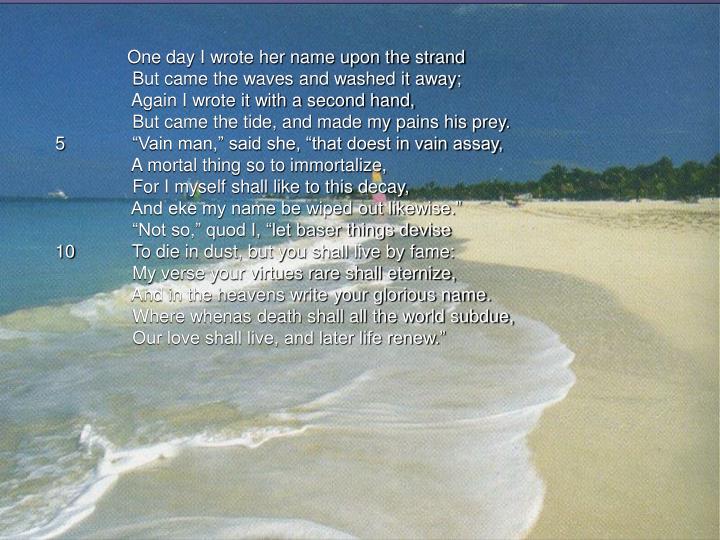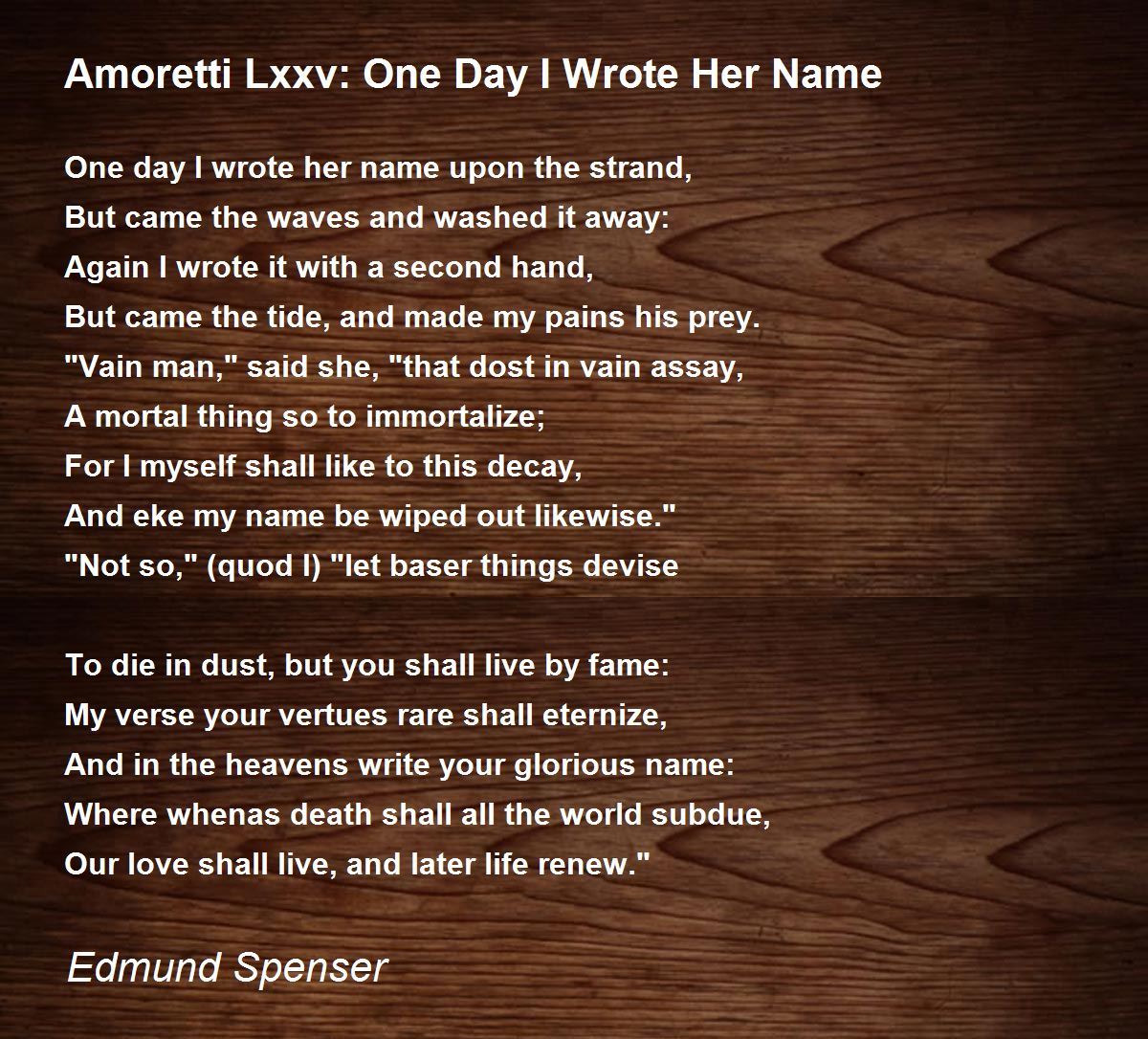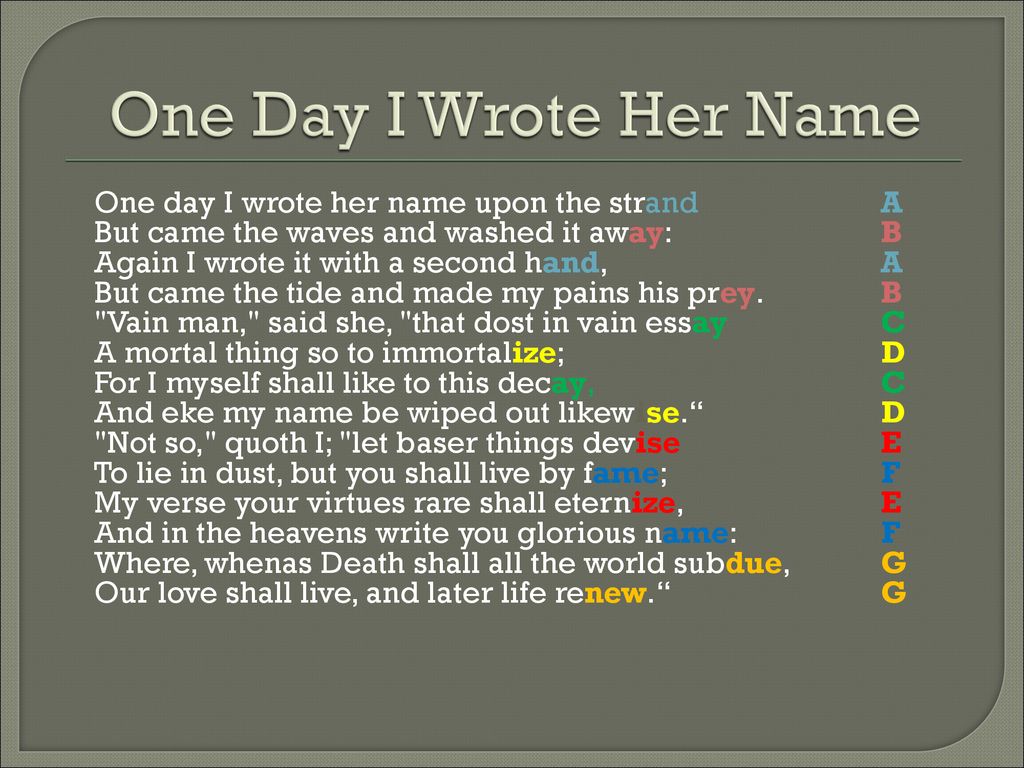
One Day I Wrote Her Name Upon The Strand Edmund Spenser Detailed Explanation In Hindi
One day I wrote her name upon the strand, But came the waves and washed it away: Again I wrote it with a second hand, But came the tide, and made my pains his prey. "Vain man," said she, "that dost in vain assay, A mortal thing so to immortalize; For I myself shall like to this decay,

ONE DAY I WROTE HER NAME UPON THE STRAND YouTube
One day I wrote her name upon the strand, But came the waves and washed it away: Again I wrote it with a second hand, But came the tide, and made my pains his prey. Vain man, said she, that doest in vain assay, A mortal thing so to immortalize, For I myself shall like to this decay, And eek my name be wiped out likewise.

One day I wrote her name upon the strand Spenser YouTube
One day I wrote her name upon the strand, But came the waves and washéd it away: Again I wrote it with a second hand, But came the tide, and made my pains his prey. "Vain man," said she, "that dost in vain assay, A mortal thing so to immortalize; For I myself shall like to this decay, And eke my name be wiped out likewise."

One Day I Wrote Her Name Upon the Strand by Edmund Spenser
One day I wrote her name upon the strand, But came the waves and washed it away: Again I write it with a second hand, But came the tide, and made my pains his prey. The first quatrain of 'Sonnet 75′ depicts the lyrical voice's attempt to immortalize his loved one. The stanza starts by setting the scene: "One day". The lyrical voice.

One Day I Wrote Her Name Upon the Strand By Edmund Spenser YouTube
By Dr Oliver Tearle (Loughborough University) Edmund Spenser's Amoretti is one of the greatest of the Elizabethan sonnet sequences; after Sir Philip Sidney's Astrophil and Stella (which was the first great sonnet sequence in English), it is perhaps the greatest of all. Sonnet LXXV from Amoretti, beginning 'One day I wrote her name upon the strand', is probably the most famous poem in.

75 One day I wrote her name upon the strand Poem Summary and Analysis LitCharts
1. become an awesome poet, 2. write a poem about your beloved, 3. BAM: instant immortality for you and your lady-friend (or man-friend) as millions of people read your poems even after you're dead. So, here's the takeaway from Spenser's "Sonnet 75": if you've got the poetry skills, people will be reading your sonnets 400 years into the future.

(PDF) One Day I Wrote Her Name upon the Strand A Review
One day I wrote her name upon the strand, But came the waves and washed it away: Again I wrote it with a second hand, But came the tide and made my pains his prey. Vain man (said she) that dost in.

One Day I Wrote Her Name Summary 75 Edmund Spenser YouTube
One day I wrote her name upon the strand, But came the waves and washed it away: Again I wrote it with a second hand, But came the tide, and made my pains his prey. "Vain man," said she, "that dost in vain assay, A mortal thing so to immortalize; For I myself shall like to this decay,

PPT 75 PowerPoint Presentation ID3225834
ONE day I wrote her name upon the strand, but came the waves and washed it away: again I wrote it with a second hand, but came the tide, and made my pains his prey. Vain man, said she, that dost in vain assay, a mortal thing so to immortalize, for I myself shall like to this decay, and eke my name be wiped out likewise.

영시할시 ep341. "One day I wrote her name upon the strand"EDMUND SPENSER 영미시영문학 임용고시
1 One day I wrote her name upon the strand, 2 But came the waves and washed it away: 3 Again I wrote it with a second hand, 4 But came the tide, and made my pains his prey. 5 "Vain man," said she, "that dost in vain assay, 6 A mortal thing so to immortalize; 7 For I myself shall like to this decay, 8 And eke my name be wiped out likewise."

"One day I wrote her name upon the strand" by Edmund Spenser (Amoretti, 75) YouTube
O NE day I wrote her name upon the strand; But came the waves, and washed it away: Again, I wrote it with a second hand; But came the tide, and made my pains his prey. Vain man, said she, that dost in vain assay. A mortal thing so to immortalize; For I myself shall like to this decay, And eke my name be wiped out likewise.

Amoretti Lxxv One Day I Wrote Her Name Poem by Edmund Spenser Poem Hunter Comments
The present sonnet "One day I wrote her name upon the strand" was published in 1595 in his famous sonnet sequence "Amoretti". The present sonnet is sonnet No. 75 in the collection of 88 sonnets. 'Amoretti' is an Italian word meaning 'little loves' which refer to the sonnets so dear to the poet.

favorite by Edmund Spenser "One day I wrote her name upon the strand, But came the waves
Sonnet 75 Lyrics. One day I wrote her name upon the strand, But came the waves and washed it away: Agayne I wrote it with a second hand, But came the tyde, and made my paynes his pray. "Vayne man.

75 by Edmund Spenser (One day I wrote her name upon the strand), Amorett, Explained in
Amoretti LXXV: One Day I Wrote her Name. By Edmund Spenser. One day I wrote her name upon the strand, But came the waves and washed it away: Again I wrote it with a second hand, But came the tide, and made my pains his prey. "Vain man," said she, "that dost in vain assay, A mortal thing so to immortalize; For I myself shall like to this decay,

One day I wrote her name LXXXV
Technical analysis of One day I wrote her name upon the strand (Sonnet 75) literary devices and the technique of Edmund Spenser More on One day I wrote her name upon the strand (Sonnet 75). While the sonnet had been around for a few hundred years before Spenser wrote Amoretti, he definitely made the form his own. Spenser's big innovation to.

“One Day I Wrote Her Name” ppt download
One day I wrote her name upon the strand, But came the waves and washed it away: Again I wrote it with a second hand, But came the tide, and made my pains his prey. "Vain man," said she, "that dost in vain assay, A mortal thing so to immortalize; For I myself shall like to this decay, And eke my name be wiped out likewise." Not so," (quod I) "let baser things devise To die in dust.
- Cambio Sterlina Inglese A Euro
- Mano Con 6 Dita Significato
- Air Force One Off White
- Coppa Del Mondo Di Rugby Femminile
- Accessori Macchina Caffe De Longhi
- Un Posto Al Sole Architetto
- Joseph Kosuth One And Three Chairs
- Determinante Di Una Matrice 3x3
- Amoxicillina Dopo Quanto Fa Effetto
- Programma Mondiali Ciclismo 2023 Oggi